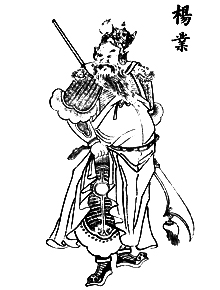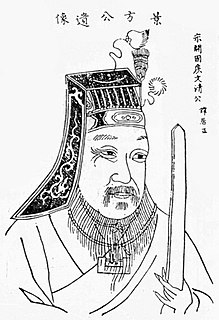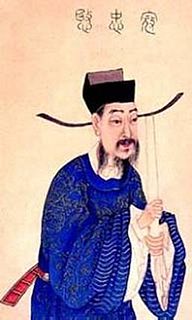
Yang Ye (楊業) or Yang Jiye (楊繼業), named Liu Jiye (劉繼業) before 979 and Yang Chonggui (楊重貴) in his youth, was a military general in imperial China, serving first the Northern Han state during the last years of the Five Dynasties and Ten Kingdoms period, and later the Song Dynasty which annexed Northern Han in 979.

Xue Juzheng was a scholar-official who successively served the Later Jin, Later Han, Later Zhou and Song dynasties. He was one of the chief ministers of the Song dynasty from 973 until his death.

Yang Yanzhao (楊延昭), named Yang Yanlang (楊延朗) before 1012 and Liu Yanlang (劉延朗) before 979, was a military general in ancient China's Northern Song Dynasty. For over 2 decades he defended Song's northern border against the Khitan-ruled Liao Dynasty, helping Song thwart Liao's repeated invasion attempts between 999 and 1004.
Wang Qinruo, courtesy name Dingguo, was an official in China's Northern Song Dynasty. He was the chancellor from 1017 to 1019 during Emperor Zhenzong's reign and from 1023 to 1025 during Emperor Renzong's reign.

Kou Zhun, courtesy name Pingzhong, was a much-praised official in ancient China's Northern Song Dynasty. He was the chancellor from 1004 to 1006 during Emperor Zhenzong's reign.
Fàn Zhi (范質), formally the Duke of Lu (魯國公), was a civil official who served under 12 emperors of 6 dynasties during imperial China's Five Dynasties and Ten Kingdoms period and the subsequent Song Dynasty. He was the Later Zhou chancellor from 951 until 960, and the Song Dynasty chancellor from 960 until 964, not long before his death. A strict adherent to legal guidelines, he had influenced Later Zhou and Song rulers to rely more on civil administration in an age dominated by the military. Fàn was a member of the elite Fàn family.
Wang Pu (王溥) (922–982) was a chancellor of imperial China's Later Zhou and Song Dynasty.

The Conquest of Northern Han by Song occurred in 979, when the forces of the Song Dynasty captured the Northern Han capital of Taiyuan in present-day Shanxi Province after a two-month siege. A relief attempt by the forces of the Liao Dynasty, which was allied to Northern Han, was easily defeated by the Song. Yelü Dilie, a cousin of Emperor Jingzong of Liao, was killed along Yelü Sha's son Yelü Deli.
Ding Wei, courtesy name Gongyan, was a Song dynasty chancellor, who dominated the courts during Emperor Zhenzong's later reign and Emperor Renzong's early reign.
Wang Ze was a rebel leader during Emperor Renzong's reign in the Song dynasty, whose agrarian army occupied Bei Prefecture for 65 days before it was crushed by the government army led by Wen Yanbo.
Zhou Huaizheng was a powerful Song dynasty palace eunuch during Emperor Zhenzong's reign. After Emperor Zhenzong's illness in 1019 made him incapable of ruling, state power gradually fell to the hands of his wife Empress Liu and chancellor Ding Wei. Zhou plotted to assassinate Ding so that Kou Zhun could return to chancellorship, but his coup failed. He was arrested by Lei Yungong and executed.
Lei Yungong was a Song dynasty palace eunuch who rose to power after foiling fellow eunuch Zhou Huaizheng's coup. He dominated court politics following Emperor Zhenzong's death, by associating with the powerful grand councilor Ding Wei. However, just a few months later he was beaten to death for illegally moving Emperor Zhenzong's burial site to acquire treasures.
Wen Yanbo, courtesy name Kuanfu, was a scholar-official of the Song dynasty who served four emperors over more than five decades. He was a grand councilor during Emperor Renzong's reign.

Shen Lun, known as Shen Yilun before 976, was a scholar-official who successively served the Later Han, Later Zhou and Song dynasties. He was one of the Song dynasty grand councilors between 973 and 982.
The Song Conquest of the Later Shu was a 964–965 war between the Song dynasty and its southwestern neighbor, the Later Shu. Despite natural barriers, the Later Shu defense proved extremely incompetent, and the Later Shu emperor Meng Chang surrendered within 70 days of the Song invasion.

Wang Dan, courtesy name Ziming, was a major politician in the Song dynasty, serving as the grand councilor from 1006 until shortly before his death in 1017. Well trusted by Emperor Zhenzong, Wang Dan was given plenipotentiary authority over some matters after 1008.
Lu Zhen (c.957–1014), courtesy name Zifa, was a Song dynasty scholar-official, historian, poet and diplomat. He was famous for his writings, including Jiu Guo Zhi, a history book on the Five Dynasties period.
Haji Sumatrabhumi was a king of Srivijaya Kingdom who sent envoys to the Chinese Song dynasty in 1017. His name is recorded in Li Tao's Xu Zizhi Tongjian Changbian as Xiachi Suwuzhapumi. The title "Haji" was generally a denomination for a vassal king.







